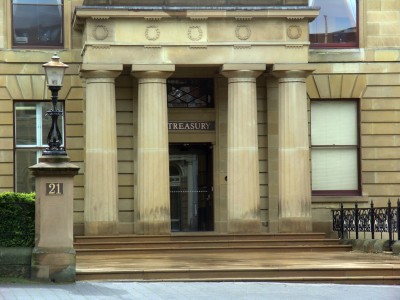The science of climate change is nothing like as complex as the politics, rife with grand schemes and empty assurances, but with little evidence of decreasing emissions from government activities. [29 September 2009 | Peter Boyer]

Climate concerns are being treated as expendable by too many top-level Tasmanian public servants, who see no benefit to their careers from changing their own or their agencies’ work practices.
Tasmania’s record rains are in stark contrast to the dust storms that signal a drought-stricken continent: such are the complex, ever-changing patterns of climate. Then there’s climate politics. Trust us humans to turn something that’s already complex into an unbelievable tangle.
Twelve days ago Kevin Rudd showed that Australian climate credibility in Brussels was low on his priority list by appointing noted climate ostrich Dr Brendan Nelson as his ambassador to the European Union.
Then off he went to the United States. In international leader mode, he warned of a “wall too high to scale” at Copenhagen in December without national emissions commitments, and called on world leaders to revive the United Nations to guide global action on climate and economic growth (if the two aren’t mutually exclusive).
But while Mr Rudd seems to see real progress in his government’s current climate policies, rhetoric and substance are poles apart. The only relevant evidence — reduced carbon emissions — says that Australia lags behind the rest of the world. When it comes to action, Mr Rudd has been all talk.
Politicians and bureaucrats talk a lot about “commitment” when they have yet to make a mark, but there’s reason to be cynical about this. Like a philanderer’s marriage vows, political commitments often fall by the wayside.
You can judge how seriously people are committed to something by how they live their lives. In government or business, commitment to reducing energy usage can be measured by people in authority changing their work habits and encouraging those under them to do the same.
There are many people in our communities who have done just that. They’ve re-aligned their lives to reduce their energy consumption and persuaded others to join them. In some cases, whole towns and municipalities are making the shift, setting ambitious targets and going after them.
A government commitment would mean directed, coordinated, observable changes in, for example, workplace electricity usage and transport arrangements. On those real-life measures, Mr Rudd’s government is an abject failure, with only scattered, sporadic shifts in workplace behaviour.
That’s the big picture. But why focus on Canberra? We can find plenty of evidence of political and administrative failure much closer to home, here on this island we like to call clean and green.
As in Canberra, Tasmania’s political masters say they’re committed to reducing greenhouse emissions, but with rare exceptions there have been no shifts in the way they, their advisers or their agency heads conduct their working lives.
Last year I was involved in information sessions with public service “climate champions”. This was a rewarding experience for me and the start of a serious effort by some good people to change the way their workplace functions. But virtually no-one I presented to in this program was higher than a middle manager, and no agency heads were present.
David Bartlett’s government has shown a lack of commitment in other ways. It has failed to curb climate-unfriendly land development. It has dragged its feet on proposals to pay property owners top prices to generate power at the home or workplace, and has remained out of a national scheme to ban energy-wasteful electric hot water systems from being installed in new homes.
While claiming to support alternative transport, it continues to treat public transport as a second-tier responsibility. While supporting mature native forest logging, it disputes research indicating this to be a major carbon emitter while avoiding doing research of its own.
The work goes on. The Tasmanian Climate Change Office continues its educational effort within the Tasmanian government, but as a low-level agency it is powerless to implement the top-to-bottom change that must happen before the government’s claims of commitment carry any ring of truth.
Too often, the Climate Change Office and its “champions” are treated as junior partners with nothing serious to say about the business of government. Climate concerns are treated as expendable by complacent superiors who see no benefit to their careers from changing anything they do.
In recent years, successive premiers have reacted positively to proposals for climate policy to be integrated into the way the government does its business. It now seems that the weight of “business as usual” has overwhelmed whatever good intentions they may have had.
To become plausible climate champions, politicians and governments must walk the talk. Each minister, each ministerial minder and each agency head must understand the urgent need for climate action and act accordingly, as if their careers depend on it. Only then will government credibility begin to recover its lost ground.
• Walking is a sure way to reduce emissions and while improving your fitness. This Friday, 2 October, is Walk to Work Day, when people are invited to leave the car at home or at least 1 km from their destination and walk to work. If you normally cross at the lights on the corner of Davey and Murray Streets, Hobart, you’re invited to join an Equal Rights at the Lights mass pedestrian crossing, at 8.10 am or 8.40 am, highlighting the need to make it easier for pedestrians to cross roads.
